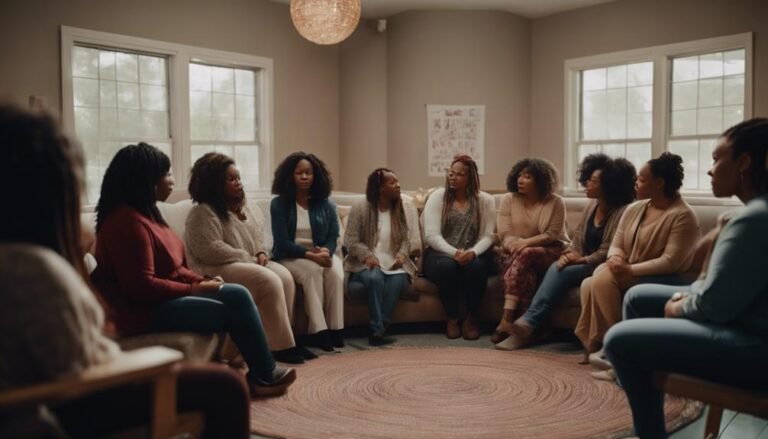When dealing with domestic violence, it is vital to use proven strategies like education, accessible support services, coordinated responses with law enforcement, empowerment programs for survivors, and addressing root causes. These approaches play a pivotal role in preventing and intervening in such situations. By implementing these strategies, you can make a significant impact and help create a safer environment for those affected by domestic violence. More insights are available on additional strategies for combating domestic violence effectively.
Key Takeaways
- Education and awareness programs for prevention.
- Accessible support services for victims.
- Coordinated response with law enforcement.
- Empowerment programs for survivors.
- Addressing root causes of violence.
Prevention Through Education and Awareness
By educating individuals and raising awareness about domestic violence, we can effectively prevent future incidents and promote healthier relationships. Education and awareness programs are powerful tools in preventing domestic violence. Through these programs, individuals learn to recognize warning signs, understand healthy relationship dynamics, and cultivate skills to intervene early.
Studies have highlighted that pivotal intervention plays a vital role in curbing domestic violence before it escalates. Community awareness campaigns further reinforce the message by changing societal attitudes towards domestic violence and encouraging intervention. Workplace training on domestic violence not only empowers employees to identify and respond to signs of abuse but also creates a safer environment for all.
Bystander intervention training equips individuals with the tools to safely intervene and support those facing domestic violence, fostering a culture of accountability and support within communities. By actively engaging in education, awareness programs, and community campaigns, we can collectively work towards preventing domestic violence and promoting healthier relationships.
Accessible Support Services for Victims
Accessible support services for victims of domestic violence are essential resources that provide immediate assistance and essential help to those in need. These services, including hotlines, shelters, counseling, and legal aid organizations, offer a lifeline to individuals experiencing domestic violence. By accessing these support services, victims can receive safety planning, legal advocacy, and emotional support around the clock. The availability of such services is pivotal in breaking the cycle of violence and empowering survivors to seek help and protection.
Support services for victims play a significant role in ensuring the safety and well-being of individuals affected by domestic violence. They serve as a beacon of hope and a pathway to healing for those experiencing abuse. By reaching out for help through these accessible services, victims can take the first step towards regaining control of their lives and breaking free from the cycle of violence.
Coordinated Response With Law Enforcement
Partnering with law enforcement agencies is vital in ensuring a coordinated and effective response to domestic violence situations. Collaborating with law enforcement not only improves victim safety but also enhances the support services available to survivors, particularly women. By establishing coordinated response protocols, swift action can be taken to protect those experiencing domestic violence, preventing further harm.
It’s essential for law enforcement to work closely with domestic violence advocates to understand the dynamics of such situations and employ trauma-informed practices for better intervention outcomes.
Furthermore, multi-agency coordination plays a pivotal role in the prosecution of domestic violence offenders, ensuring accountability and, most importantly, the safety of survivors. Effective partnerships between law enforcement and community resources can greatly increase access to support services, further contributing to the prevention and mitigation of domestic violence incidents.
Empowerment Programs for Survivors
Empowerment programs for survivors of domestic violence offer essential education and resources to help individuals regain control over their lives and move towards a brighter future. These programs play a vital role in the prevention of gender-based violence by providing survivors with the necessary tools to break free from abusive situations and rebuild their lives.
Through empowerment programs, survivors receive support in various areas, including financial independence, understanding legal rights, and emotional healing. By learning skills like budgeting, job readiness, and self-care, survivors can enhance their confidence, self-esteem, and decision-making abilities.
Many participants in empowerment programs have reported feeling empowered to make positive changes in their lives and break the cycle of abuse. These programs are designed to equip survivors with the knowledge and resources they need to create a safe and independent future, fostering a sense of agency and hope for a life free from domestic violence.
Addressing Root Causes of Violence

Understanding the root causes of domestic violence involves delving into the societal norms and attitudes that fuel gender inequality and power imbalances. Addressing domestic violence at its core requires challenging toxic masculinity, patriarchal beliefs, and other factors that contribute to intimate partner violence.
By implementing prevention programs that promote healthy relationship dynamics, communication skills, and conflict resolution strategies, we can proactively tackle the fundamental causes of violence.
Education on consent, boundaries, and respect is vital in preventing domestic violence by addressing underlying issues related to control and entitlement. Empowering individuals to recognize and challenge harmful beliefs and behaviors plays a key role in dismantling the root causes of domestic violence.
Together, we can work towards creating a society where respect, equality, and healthy relationships are the norm, ultimately reducing the prevalence of intimate partner violence.
Promoting Culture of Respect and Equality
Establishing a culture of respect and equality is essential in combating domestic violence and fostering healthier relationships. Promoting a society that values mutual respect, communication, and empathy plays a significant role in creating safer environments for all individuals, particularly in the domain of public health and violence against women.
By encouraging open discussions about consent, boundaries, and what constitutes a healthy relationship, we can work towards dismantling harmful power dynamics and attitudes that contribute to domestic violence.
Educational programs that challenge traditional gender roles and stereotypes are instrumental in preventing instances of abuse. These initiatives help individuals recognize and speak out against abusive behavior, contributing to a society that’s intolerant of violence.
Comprehensive Prevention Programs

Investing in thorough prevention programs is essential for addressing the root causes of domestic violence and creating safer environments for all individuals. These programs play a pivotal role in tackling factors that influence domestic violence, such as gender and racial inequities. By focusing on education and awareness campaigns, holistic prevention programs aim to improve safety in schools and communities, benefiting marginalized groups like women, transgender individuals, non-binary folks, and women of color.
These initiatives not only work towards preventing domestic violence but also target dating abuse and sexual violence, leading to significant societal changes. Despite their effectiveness, many prevention programs struggle with inconsistent funding, limiting their expansion and impact.
Economic Independence Initiatives
To empower survivors of domestic violence, focusing on economic independence initiatives is essential to breaking free from financial dependence on abusers. Programs that offer job training, financial literacy education, and employment opportunities play a vital role in helping survivors establish stable incomes.
Additionally, access to affordable housing and affordable childcare services are key components that enable survivors to rebuild their lives independently.
By attaining economic stability, survivors are less likely to return to abusive relationships for financial support, thereby breaking the cycle of violence. Studies have shown that economic empowerment programs are highly effective in reducing the risk of recurring domestic violence incidents.
Supporting survivors in gaining economic independence not only enhances their financial security but also empowers them to lead self-sufficient and fulfilling lives free from the constraints of financial abuse.
Frequently Asked Questions
What Are Coping Mechanisms for Victims?
You can find solace in self-care practices, reach out to support groups for comfort, seek therapy for healing, and empower yourself through safety planning. Remember, you deserve love, respect, and safety. You are not alone.
Conclusion
As you consider the impact of domestic violence on individuals and communities, remember that education and awareness are key in preventing future cases.
Did you know that every minute, 20 people are victims of intimate partner violence in the United States alone?
By supporting accessible services, empowering survivors, and addressing root causes, we can work together to create a culture of respect and equality.
Your actions matter in the fight against domestic violence.







